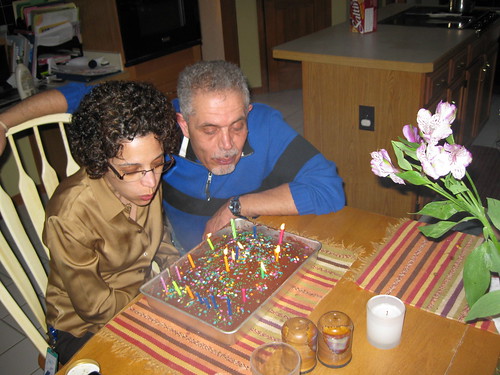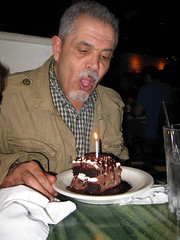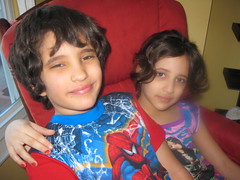
Mohammed F. Shaltami, 1945-2010.
[Source: www.tieob.com]
[Source: www.tieob.com]
Libyan poet Mohammed ash-Shaltami lived all of his sixty-five years in Benghazi, except for the time he spent moving between political prisons in different cities. On Wednesday, 24 March 2010, Libya said farewell to a poet who symbolized the triumph of love over pain, principle over tyranny. He started his professional career as a school teacher at the age of 18, which was not uncommon in Libya of the early 60's, when need trumped qualifications. One of my vivid memories of second grade is saying farewell to our teacher who had graduated high school and had to leave Misrata to one of two universities, Tripoli or Benghazi. He went to Benghazi, in fact, because in those days the academic major (literary or else scientific) essentially decided the campus, and most literary majors went to Benghazi. That was also a turbulent time on the regional level, a time when populations and ideologies multiplied.
Shaltami spent a lot of time as a prisoner of conscience, under both of the--opposed--political regimes that have ruled Libya since its 1951 independence. Under the first regime, Shaltami was detained in 1967, charged with belonging to the Movement of Arab Nationalists. His poetry was really what got him in trouble because it was seen as subversive literature that ran in support of the whole wave of "ists", including pan-Arabist, revivalist, revolutionist, socialist, leftist, communist, etc. All of these were seen as externally motivated threats and met with force by the ruling regime. In 1969 Libya got its turn at "revolution," bearing many of the fashionable slogans of the day. Four years later, in 1973, and under the banner of "cultural revolution" the new Libyan regime decided there would be only one "ist" and they went on a cleansing campaign against the "reactionaries," or call them enemies of the Ist, and this brought Shaltami to his first, brief encounter with revolutionary oppression.
Shaltami's last imprisonment was brought on by the university student unrest in April, 1976. That was my final year of high school. In those days, the "demo-n-rally" industry was going strong, fueled by oil and revolutionary hot air. The government sent busses to load up boys and girls from Tripoli high schools, and other government employees, and all of them thought it was just another rally. At the University of Tripoli, the students had staged a sit-in to protest government interference in the student union elections. The protesting students were told they would be trampled upon by the marching forces of the revolution. It was an awful bloody confrontation of ignorant vs. innocent, both sides framed in a position of self defense. The date of April 7th was then proclaimed "Student Revolution Day" and subsequently marked every year with arrests and on-campus executions of students who were fingered as "enemies of the revolution." The hangmen, and women, were also student ideologues that were empowered by the ruling regime.
Shaltami's last imprisonment was brought on by the university student unrest in April, 1976. That was my final year of high school. In those days, the "demo-n-rally" industry was going strong, fueled by oil and revolutionary hot air. The government sent busses to load up boys and girls from Tripoli high schools, and other government employees, and all of them thought it was just another rally. At the University of Tripoli, the students had staged a sit-in to protest government interference in the student union elections. The protesting students were told they would be trampled upon by the marching forces of the revolution. It was an awful bloody confrontation of ignorant vs. innocent, both sides framed in a position of self defense. The date of April 7th was then proclaimed "Student Revolution Day" and subsequently marked every year with arrests and on-campus executions of students who were fingered as "enemies of the revolution." The hangmen, and women, were also student ideologues that were empowered by the ruling regime.
Resist your enemies
And reject the edicts that eulogize you to yourself
Before, during and after the dreaded April of 1976, Shaltami's poetry figured prominently in the literature of protesting students. That was his crime, and for that he paid 12 years of his life under cruel and inhumane conditions. The words he had written to foretell the coming of the dawn became slogans to protest the amassing darkness, and that I believe was his cross to bear far beyond 12 years. The university students who were involved in the April 7th tragedy were from the same generation he had taught in elementary and middle school. How could a man bear the pain of seeing his children killing each other, and how could he justify to himself that his mere words were used both to motivate and to condemn?
After his release from prison in 1988, the poet kept away from the public. He was once an official Sufi, subscribing to the Alawi-Shadhli approach, and that must have helped guide his inward journey for healing, which I think he reached ultimately and found balance in humanism. He did not publish anything for at least two decades. Of course he kept his personal relations, but to the public he left only his poetry, never compromising. He must have been under all sorts of pressure, from all sides, to write for and against, but he didn't. The revolutionary poet who was silenced by the revolution had bigger concerns.
In hindsight, perhaps one can say his public silence not only made his poetry more audible, but it was also received as the best available form of steadfast resistance. His image was imprinted, and he did nothing to change it when he finally returned. His last published collection from 2002 includes poems he wrote in prison.
In hindsight, perhaps one can say his public silence not only made his poetry more audible, but it was also received as the best available form of steadfast resistance. His image was imprinted, and he did nothing to change it when he finally returned. His last published collection from 2002 includes poems he wrote in prison.
One of many eulogies of Mr. Shaltami came from his friend and former prison-cell mate, Dr. Mohammed al-Mufti, who included a quoted passage that had previously been censored out of his book "Dialogues." In this passage, Shaltami describes some of what happened to him in April of 1976. The following is my translation of the Arabic original.
I was arrested on April 11th, 1976. An informant came to me in the National Library and took me to the Military Police Camp in Birka. There he turned me over, his farewell to me was, "God help you."I ended up with a high ranking army officer. Hasan Ashkal. As soon as he saw me he started reciting a chant. I thought he was joking. He took my bag, which contained a copy of the Quran, a prayer rug, and packs of cigarettes. The prayer rug was red. He started displaying it to the prisoners and the guards while repeating, "Didn't we tell you he is a communist? Even the prayer rug is red."He turned to me and said, "The Revolution was white, and we will turn it red with your blood." Then he picked up a thick steel cable and starting hitting me. I began to recite verses from the Quran, and his voice began fading away from my hearing. I fell on the floor, and I saw his footsteps. He jumped in the air and landed with all his weight on my chest. Then I became unconscious, and didn't recover until night time. I was wet, and the cell was flooded with water. They repeated the episode on the next day, in the presence of the detained students and the officer had ordered them to cheer. Poor guys. What the others experienced was worse than what happened to me.
...
And the wanton blow kills my feet
But I sing
And the whip disappears in my flesh
But I sing
And I sing
...
Also taking part in torturing me was an officer of the secret police. May Allah forgive him. I knew him by a strange twist of fate. We were together as students in Sidi Hussein school. Both of us were poor, barefoot and not diligent! We shared the same desk. During the interrogations he would mention our acquaintance repeatedly. And he used to search for information as much as he took pleasure from the screams of his victims. Regretfully I recall that in school, as a child, he always volunteered to inform on any disorderly students.In a few days the treatment changed. Injuries to my head were numerous. And they started treating me. The chief interrogator used to come to me and repeat, "I do not know you. The matter is not personal. I am one with a cause." And he used to ask me for forgiveness.Years later, the two men died. Both were killed. Such is life. Whoever ends his role leaves the theater of life.
Below, I include a poem by Mohammed Shaltami entitled "Letter to the Children," which I translated to English. The original text in Arabic can be read here and here. I present the translated poem with a necessary disclaimer. It is difficult for me to translate poetry, especially since it can be laden with double entendre and various codes and symbolisms. In this case, the language is unusually simple and direct, but nonetheless capable of multiple interpretations. For example, the poem uses a verb that could mean "to push forth," "to offer," or "to pay." Who knows what the poet meant? Recognizing that he was aware of all the multiple meanings, I use them all.
Sometimes I think translating poetry is like making a black and white reproduction of an oil painting. But, even if the color is distorted or lost all together, there is--I hope--still some hints of the original form left. In addition, I have had no formal education in the presentation or appreciation of western poetry. I sincerely apologize for all shortcomings in this translated poem, and I assure you they are all of my making.
Letter to The Children
Here I am offering my head to the hangman
On a plate of revolutionary poetry and pure anger
For love
For your sake, my children awed
By this world
As the eyes of hatchlings of down-feathered birds
And I know you have no water
I know you have no trees
And I know that
No Omar bin al-Khattab do I encounter
At the military prison
And I know... but
For your sake
My two children, and for the sake of all children
In all the forsaken land
In our noisy world, I pay
I pay the hangman with my head
On a plate of revolutionary poetry, so that I may seed
In my tomb today
For your sake and for the sake all the children, sweeter
Than the excited colors of the summer moon,
Nurseries of olives and carnations
That when my branches extend over the grave
You would find shade
And thus I offer my head to the hangman
Embracing "No" in the face of the hysterical hatred, visible
On the brow of the Age
I don't know,
If I were not to accept my death anywhere anytime
I would hide my face from you
When you discover the oppression
What am I to say to you, if you came
O my children
Saddened and wronged
Because the world is worse than
To tolerate humans
And life
Is unworthy of all the minutes
Or moments of the vanishing lifetime
When the moment is empty
Of meaning
So we tie to the cross of hollow time
All the years of lifetime
Where am I to hide my face from you
When you discover that I
Was the culprit
Was the slayer and the slain
And was drowning in my sorrows
What am I to say to you if you came
Offended
And the police had cracked in the dark times
The heads of children
So I would feel that I was the police
I was the age
And I was the culprit
And thus I offer to the hateful hangman
My head
On a plate of revolutionary poetry and pure anger
For love
So I may kindle for your sake
And for the sake of all children, a candle
So when the night veils and turns horrific
And long
I would dissipate with the light poured with drops
Of my blood
Some of the loneliness
O Breast down of wild hatchlings
Here I am offering my head to the hangman
On a plate of poetry of silver and pure gold
And love
So that I may come to know through poetry the way of the Lord
And I know you have no water
I know you have no trees
I know that no Omar b. al-Khattab I meet in the military prison
And that I am not breaking
In the depth of the dark dungeon
And I know that I
Will not beg for the embarrassing pardon for your sake
For orphanhood is beautiful
I was an orphan before you
Orphanhood reared me
Taught me how to resist my black sadness
To grow like the wild trees
Extend my roots underground so
I may soak up my life
I recognize the taste of honey dissolved
In the gourd fruits
For orphanhood is my father
Taught me how to say to the wonderful sunlight
O Father
And to grow like wild trees with no ego
O my two children
How I loved you
But I loved freedom more
How much I sang for the blue sleep
To close your eyes
And hide you
From the ghost of summer insomnia
But I had been singing
For people's awakening
From the death of the black age, I was
Resisting the torture by the guards
Do not cry on the night of my execution
For orphanhood is
Softhearted and beautiful
And dying for a better morning,
On the fields of passion, is noble
I will dissipate some of your solitude
For night is terrible and long
And I will seed in my unknown tomb for your sake
And for the sake of the eyes of the children, sweeter
Than the joyously lighted summer moon,
Nurseries of olives and carnations
That when my branches extend over the grave
You would find a shadow
And thus I push forth my head to the hangman, embracing "No"
In the face of hysterical hatred visible
On the brow of the age
O my two children
O breast down of wild hatchlings
I am here paying the hangman with my head
On a plate of poetry of silver and pure gold
So I may know through revolution and poetry the way of the Lord
And I know you have no water
I know you have no trees
I know that no Omar bin al-Khattab I meet at the military prison
And that I am unbroken
In the depth of the dark dungeon
And I know that I
Will not beg for the embarrassing pardon for your sake
For orphanhood is beautiful
I was an orphan before you

Shaltami beams triumphantly over the branches.
[Source: afaitouri.maktoobblog.com]




